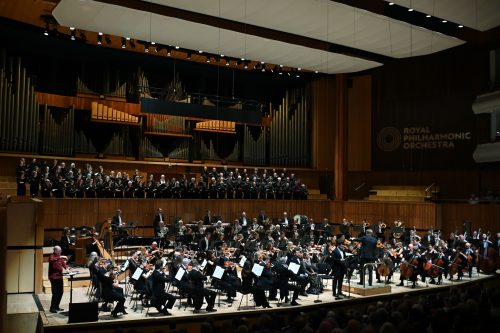
[ad_1]
 United Kingdom Elgar, Weinberg, Rachmaninov: Sheku Kanneh-Mason (cello), Mirjam Mesak (soprano), Pavel Petrov (tenor), Andrii Kymach (baritone), Paul Whittaker (BSL performer), Philharmonia Refrain, Royal Philharmonic Orchestra / Vasily Petrenko (conductor). Royal Pageant Corridor, London, 11.4.2024. (CK)
United Kingdom Elgar, Weinberg, Rachmaninov: Sheku Kanneh-Mason (cello), Mirjam Mesak (soprano), Pavel Petrov (tenor), Andrii Kymach (baritone), Paul Whittaker (BSL performer), Philharmonia Refrain, Royal Philharmonic Orchestra / Vasily Petrenko (conductor). Royal Pageant Corridor, London, 11.4.2024. (CK)

Elgar – Within the South (Alassio)
Mieczyslaw Weinberg – Cello Concerto
Rachmaninov – The Bells
Not but absolutely recovered from the China Shenzhen Symphony Orchestra’s thrilling efficiency of Respighi’s Pines of Rome in The Anvil, Basingstoke (evaluate by Marc Bridle right here), I used to be wanting ahead to Elgar’s musical postcard from Italy: for many of my life I’ve blown cold and hot about Elgar’s music, however I’ve beloved Within the South since Silvestri’s recording with the Bournemouth Symphony Orchestra appeared within the late ‘60s.
Alas, this efficiency from a crew of confirmed excellence was not in that league: the opening failed to brush us off our toes because it ought to, and although the Elgarian elan put in an occasional look Vasily Petrenko appeared decided to take the reflective episodes (the clarinet’s Moglio tune the primary of them) as slowly as potential, in order that the music turned becalmed. Throughout the viola’s canto popolare – atmospherically performed by Abigail Fenna – the principal clarinet took the chance to do some instrumental restore work: not the type of factor one would discover if the music was correctly casting its spell. It was superbly performed; however it failed to fireplace.
Mieczyslaw Weinberg’s Cello Concerto was a unique matter. I’ve to admit that this was my first dwell expertise of the music of this composer – in 1939 he was a 20-year-old on the run from the Nazis who interned and murdered his household – and who solely now could be rising from the shadow of Shostakovich. I really feel privileged that my introduction to Weinberg was within the palms of Sheku Kanneh-Mason. His efficiency was spellbinding from the beginning, taking part in with hauntingly veiled tone in opposition to the quiet pulse and throb of the strings, finally breaking into anguished declamation. The hyperlink with Shostakovich was abundantly clear, although it by no means clouded the sense that we have been listening to a private and authentic voice: this was partly as a result of big integrity of Kanneh-Mason’s taking part in, his plain utterance by no means over-sweetened by an excessive amount of vibrato, and the attractively woody, barely furry tone he coaxed from his 1700 cello.
The second motion, Moderato, started with – of all issues – a Habanera on plucked violas and cellos; right here, and within the stern moto perpetuo that opened the following Allegro, there was a way of a Mahlerian hole opening up between the music’s floor and its depths, fraught with tensions. A skirling march – pure Shostakovich; a sarcastic trumpet, an insouciant piccolo; a serene melody on the cello that masks a rising sense of unease. There may be anger, concern, even violence on this music; the cello is difficult put to it to revive equilibrium in an prolonged cadenza. Taking the musical line all the way down to a thread of sound, Kanneh-Mason held us spellbound (regardless of the coughers).
The finale introduced extra highly effective orchestral taking part in earlier than the cello wound the concerto to a peaceful conclusion. Consolatory; beatific; exhausted; resigned – all of those, or none? Within the uncertainty lies the music’s energy. No doubts, although, about Kanneh-Mason’s efficiency: delicate, devoted, and ego-free. He was cheered to the rafters, and the orchestra clearly adored him. For his encore he performed Weinberg’s Prelude No.18 for solo cello: a transferring threnody. I used to be most likely not the one individual within the viewers wanting to listen to him play the opposite 23.

Rachmaninov’s cantata The Bells after the interval was an unqualified triumph. Petrenko was on house floor right here, and he impressed a coruscating efficiency from the Royal Philharmonic Orchestra, doing full justice to Rachmaninov’s brilliance as an orchestrator and his instinctive sense of drama. The soloists too have been excellent: the sweet-toned tenor Pavel Petrov discovered it exhausting to venture his voice over the hubbub in elements of the primary motion, however within the second the soprano Mirjam Mesak’s clear, bell-like voice was a pleasure to listen to, opening out thrillingly on the motion’s climax. The advantageous baritone Andrii Kymach introduced appropriately cavernous gloom to the ultimate motion: he had me hoping that Petrenko would possibly interact him for Shostakovich’s Babi Yar.
The actual heroes of the night, although, have been the Philharmonia Refrain. Not particularly massive – round 100 singers – they blew us away with their first entry: precision, assault, and sufficient quantity for Gurrelieder. The quieter moments – their buzzing over harp, piano and celeste later within the first motion – have been magical too. They have been fabulous: the mixed energy of refrain and orchestra on the climaxes was shattering. A gentleman sitting behind me reckoned that no refrain can produce such decibels until it’s stiffened with skilled singers: whether or not or no, enthusiastic plaudits to the Philharmonia Refrain and their Director Gavin Carr. A advantageous live performance; and the conjunction of Russian conductor, Estonian soprano, Belarusian tenor and Ukrainian baritone had me dreaming of a greater world.
Chris Kettle
[ad_2]